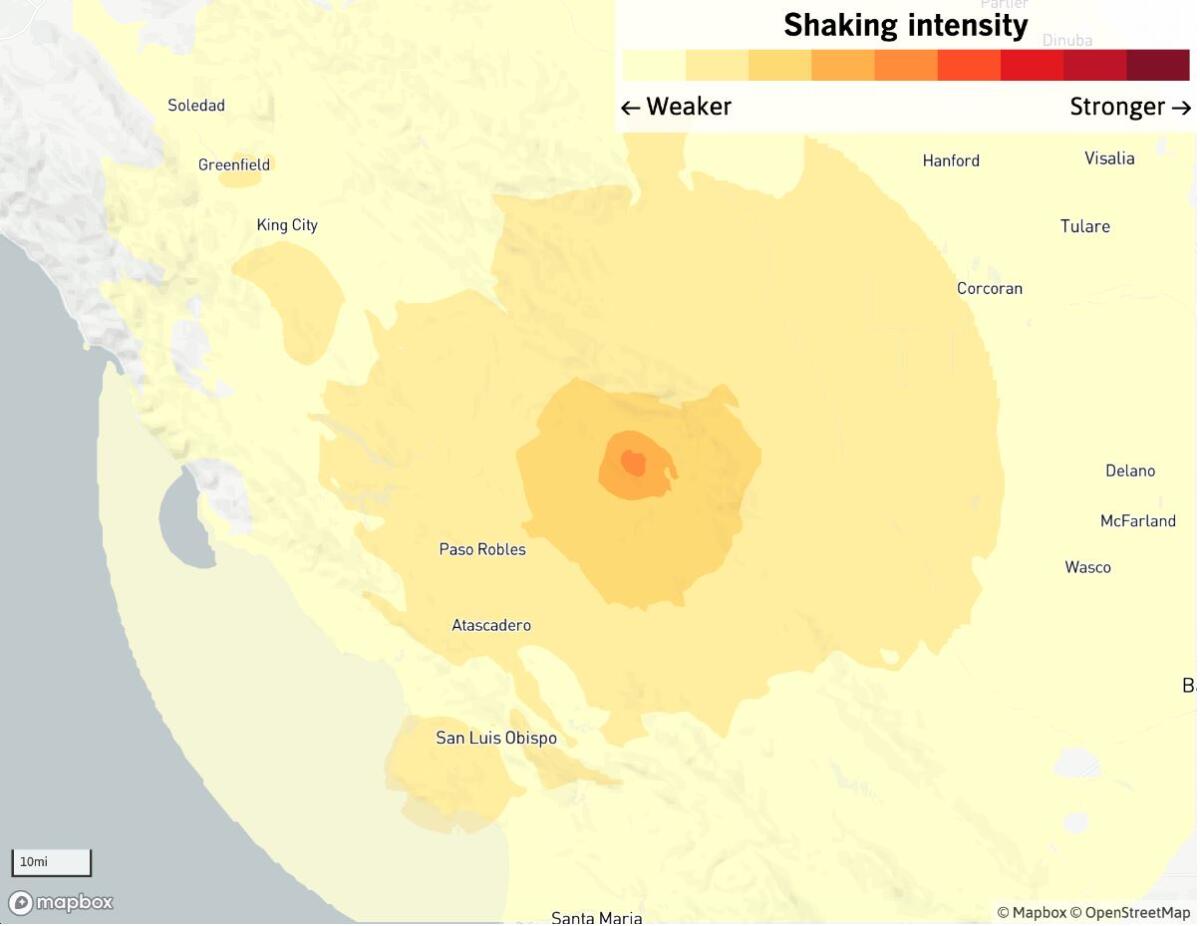A milestone: Earthquake early warning system sends first public alert to smartphones in California

- Share via
In a milestone, California’s new statewide earthquake early warning cellphone app sent out its first public alert for a magnitude 4.3 earthquake that ruptured Tuesday in the mountains between the Central Coast and San Joaquin Valley.
More than 40 people received the warning, said Jennifer Strauss, project manager for the MyShake app, which was created by UC Berkeley and released publicly in October. It is available on iOS and Android systems.
Because of the weak magnitude of Tuesday’s quake, the area in which shaking was felt was relatively small and close to the epicenter in the Cholame Valley, confined to just portions of San Luis Obispo, Monterey, Kings and Kern counties. There were no reports of damage.
The MyShake app relies on earthquake information calculated by the U.S. Geological Survey’s backbone ShakeAlert system, which gathers earthquake sensing data from a network of hundreds of ground sensors throughout the West Coast.
Earthquake early warning systems can operate because today’s communications systems are able to send warnings about shaking faster than the seismic waves can move through rock.
Such systems can work particularly well in strong earthquakes, providing seconds of alert that allow dentists to remove drills from mouths, elevators to let passengers off and allow people to drop, cover and hold on before strong shaking hits. In Tuesday’s quake, the system took 8.7 seconds to issue an alert, USGS scientist Robert de Groot said.
But the systems generally don’t warn people very close to the epicenter: There’s too little time after the earthquake starts to get seconds of warning.
Paso Robles was the closest city to the epicenter, about 22 miles to the southwest. Although shaking was felt in the city of 32,000, it was so mild that not a single person called the Fire Department, said Chief Jonathan Stornetta. “I didn’t see any damage or effects from the earthquake,” he said.
The city of Los Angeles has its own version of an earthquake early warning app, ShakeAlertLA, which was developed by AT&T. It sends warnings for users physically located in Los Angeles County.
Some people complained when that app did not trigger alarms in advance of light shaking that hit parts of Los Angeles County on July 4 and July 5, when earthquakes of magnitude 6.4 and 7.1 hit the Ridgecrest area about 125 miles away from Los Angeles. The intensity of shaking in L.A. County was not enough to produce widespread damage but lasted long enough and was stronger to be scarier than usual.
Officials decided to lower the threshold for warnings in future earthquakes.
Both the MyShake and ShakeAlertLA apps will be triggered for users in a particular area if an earthquake of magnitude 4.5 or greater is recorded and if the minimum projected shaking at a particular location is weak, or intensity level 3 on the Modified Mercalli Intensity Scale. Under such conditions, shaking is felt quite noticeably by people indoors and can cause stopped cars to rock slightly and feels as if a truck is passing by, but other people might not recognize the movement as an earthquake.
The MyShake app sent out an alert Tuesday because the initial reading for the earthquake came in at magnitude 4.8, higher than its final calculated magnitude of 4.3.
More to Read
Sign up for Essential California
The most important California stories and recommendations in your inbox every morning.
You may occasionally receive promotional content from the Los Angeles Times.












